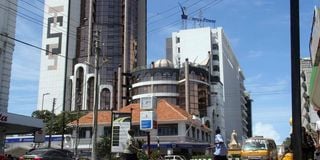Premium
Inside TSS siblings' fight for late Mombasa tycoon's billions

The TSS building along Nkurumah Road in Mombasa City in a picture taken on July 26, 2016.
What you need to know:
- Mr Jamal has accused his siblings of failure to diligently distribute the estate as per the wishes of the deceased.
- The High Court has allowed administrators of the estate to file a response to the application by Mr Jamal.
A succession case involving the children of the late Mombasa tycoon Tahir Sheikh Said has further exposed the bad blood within the family of the deceased.
This comes even after some of the properties of the deceased were placed under receivership or sold over unpaid bank loans.
The late businessman, who was popularly known as TSS, invested heavily in various sectors of the economy, particularly in the public transport and grain milling sectors.
His death in June 2020 resulted in a dispute among his family members over his wealth, despite the fact that he left a Will.
According to a list of properties attached to an application filed in court by one of his sons, Jamal Tahir Sheikh Said, the deceased owned property in Nairobi, Mombasa, Lamu, Malindi and in South Coast.
Mr Jamal has accused his siblings, who are the administrators of his father's estate, of failure to diligently distribute the estate as per the wishes of the deceased.
According to the case documents, the administrators of the estate are Osman Tahir Sheikh Said, Amina Tahir Sheikh Said, Said Ahmed Tahir Sheikh Said and Fatma Tahir Sheikh Said.
Among the properties which have been listed in court documents include 33 parcels of land in Mombasa owned by companies associated with the deceased, some in his name and others in the name of his sons.
Companies belonging to the deceased also owned 10 parcels of land in Nairobi, a parcel of land in Moyale, five parcels of land in Malindi and eight parcels of land in Lamu.
In South Coast, the deceased owned three parcels in his name and one in his company’s name. He also had properties in London, Middlesex and in Cairo.
The deceased also had shares in Kenya Airways Ltd, CFC Life and Centum Investment Company Ltd.
The petitioner says that his father left two wives, two ex-wives and a total of 20 children, including himself, but no person entitled by virtue of any attachment in priority to the children to share with them his estate.
He also says that unless the court intervenes, the quickly diminishing estate of the deceased will be wasted to the detriment of some of the beneficiaries who have been neglected by the executors.
Other properties owned by the late businessman, including parcels of land, luxurious homes, commercial buildings and grain milling plant, were either placed under receivership or sold over unpaid bank loans amounting to more than Sh3 billion.
Mr Jamal is seeking to have the administrators restrained from administrating the estate of the deceased or interfering with it, pending the hearing and determination of the case.
He also wants the administrators compelled, whether by themselves or their representatives, to deposit in court all the title documents which they are holding in respect of property forming part of the estate of the deceased.
Mr Jamal also wants the administrators ordered to provide full, detailed and accurate accounts of the estate including all income and expenditure.
“In default of providing the accounts, the administrators be held personally and criminally liable as provided by law,” part of the case documents state.
According to Mr Jamal, the respondents (administrators of the estate) were issued with letters of grant of administration after being appointed as administrators from various suits in court including a citation and also appointed by the deceased via his will dated June 12, 2012.
He claims that since being appointed as administrators, the respondents have mismanaged the estate of the deceased through irresponsible decisions and negligent distribution.
“No distribution of the estate has taken place as only one family has been benefitting to the detriment of other family members who are also beneficiaries,” part of the suit documents state.
“The respondents have failed to diligently proceed with the administration of the deceased estate,” the case documents state.
In his affidavit, Mr Jamal says that he is a resident of Kwale County and that his father died testate on January 10, 2017 in Johannesburg, South Africa.
Mr Jamal says that the deceased had prepared a last Will and testament naming all beneficiaries of his estate and appointed Osman, Amina and Said as the joint executors.
“As per the wishes of the deceased, the executors were to act in the best interest of the family because he intended that all beneficiaries be provided for,” states Jamal.
He wants the letters of administration granted to the respondents be revoked and new ones issued to him.
“To protect the deceased estate from wastage, dissipation and mismanagement, the grant issued to the respondents should be revoked,” Mr Jamal says in his petition.
At the same time, the High Court has allowed administrators of the estate to file a response to the application by Mr Jamal.
Justice Gregory Mutai directed Osman, Amina, Said and Fatma, who are also the children of the deceased, to file and serve their responses within 14 days.
The case will be mentioned on February 22, 2024.





